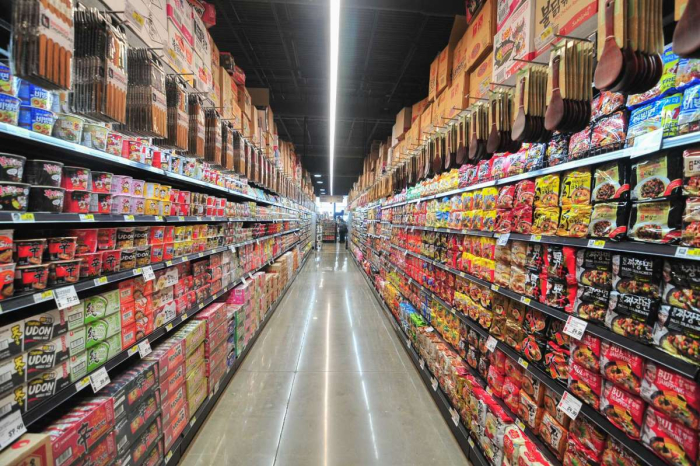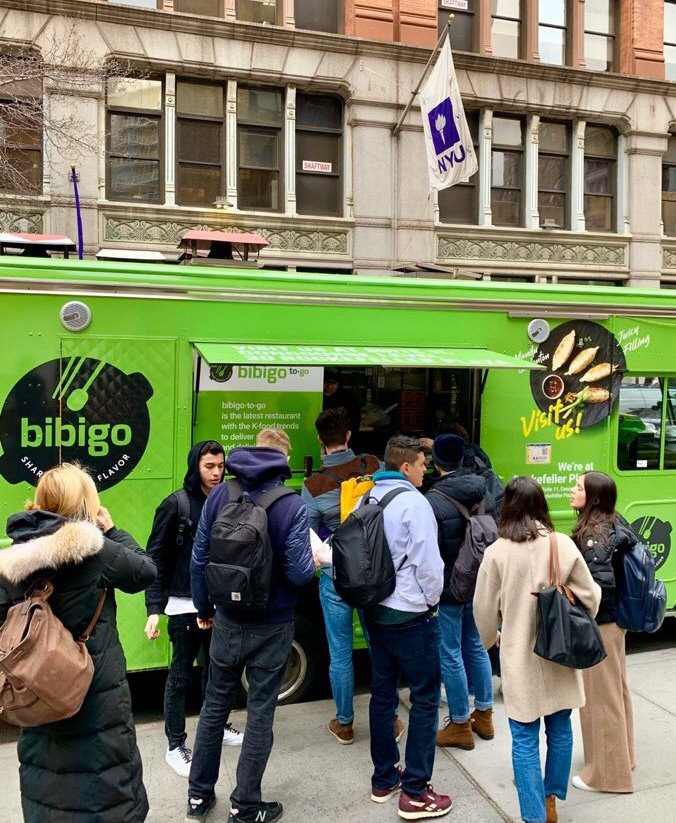F&B
Food triggers next phase of global K-culture craze
From ramen, kimchi to corn-based snacks, South Korea's packaged food products post sustained sales growth globally
By Oct 05, 2021 (Gmt+09:00)
5
Min read
Most Read
LG Chem to sell water filter business to Glenwood PE for $692 million


Kyobo Life poised to buy Japan’s SBI Group-owned savings bank


KT&G eyes overseas M&A after rejecting activist fund's offer


StockX in merger talks with Naver’s online reseller Kream


Mirae Asset to be named Korea Post’s core real estate fund operator



The ongoing global fever over South Korean music and entertainment content is driving the rapid growth of the country’s packaged food manufacturers.
South Korea exported the largest amount of packaged food last year since the country was established in 1948. Excluding livestock and marine products, alcoholic and non-alcoholic beverages, South Korea in 2020 exported approximately $4.3 billion worth of food to the world. Despite the global pandemic, the 2020 export figure grew by 14.7% from about $3.7 billion in 2019.
The industry posted further growth during the first two-thirds of this year as well. South Korea’s packaged food exports until August reached $3.1 billion, up 8.6% from about $2.9 billion during the same period in 2020. The figure excludes locally manufactured Korean food, such as ramen or kimchi products made in the US.
Market experts note that the sustained growth is largely driven by the sharp demand hike from the global fans of Korean culture. They say that the continued success of BTS and Blackpink in the global music scene, as well as the recent craze over the Korean-made Netflix series Squid Game is attracting more fans to dig deeper into other areas of Korean culture such as food and drinks.
At the same time, industry insiders note that such success could not have been possible without near-ceaseless R&D and brand marketing efforts over the last decade.

BIBIGO’S DECADE-LONG JOURNEY IN BECOMING A MAJOR FOOD BRAND
South Korea’s packaged food leader CJ Cheiljedang Corp.'s five-year marketing partnership with the Los Angeles Lakers came as a pleasant surprise to the global basketball fans and K-food lovers alike.
What was even more astonishing was that it was LA Lakers, known for its highly demanding attitude in choosing corporate sponsors, contacted CJ first for potential partnership opportunities.
The deal insiders note that LA Lakers wanted to build a long-term partnership with the CJ Group due to its competitive strengths in the cultural sector. The group’s entertainment affiliate CJ ENM Co., the producer of the movie Parasite, is eyeing to become Asia’s Marvel Studios. Likewise, the group has been investing heavily in product R&D and brand marketing initiatives of its premium food brand Bibigo since it was launched in 2011.
Bibigo, which CJ believes will one day become a major global brand like Nestlé and Kraft, globally sold 1.9 trillion won ($1.6 billion) worth of packaged food like frozen dumplings and bibimbap last year. The figure is projected to reach 2.3 trillion won ($1.9 billion) this year, with more than half of the sales made in overseas markets.
“Other South Korean food companies have started to benefit from the premium K-food image that CJ Bibigo has built over the last 10 years,” said a food industry official.
RAMEN, KIMCHI & SNACK MAKERS POST UNPRECEDENTED GROWTH
South Korea’s largest instant noodle maker Nongshim Co. said on Oct. 5 that its world-famous brand Shin Ramyun’s overseas sales this year up to the third quarter has surpassed domestic sales for the first time since the ramen was launched in 1986.
The company said that sales of 370 billion won ($312 million), or 53.6% of the global total of 690 billion won ($582 million), was generated overseas up to the third quarter. Nongshim added that the annual global sales of Shin Ramyun will reach 1 trillion won ($843 million) in 2022.
A Nongshim representative said the company’s focus in online marketing during the pandemic has proved fruitful. The company’s online ad, titled Instinct of Delicious - Shin Ramyun, recorded more than 14 million views on YouTube.
The company also shared that it is currently building a second plant in LA, to be completed by the end of 2021, right next to its first ramen plant built in 2005. The company said that the second plant will focus in addressing the demand in Mexico and Latin America.
Nongshim’s long-time rival Samyang Foods Co. is also expanding its global presence. The company announced on Oct. 5 that it will set up a local entity in Shanghai for further expansion into the Chinese market. The company had also set up an American entity in LA earlier this year in August.
Globally known as the maker of the Buldak stir-fried noodles, Samyang generates 57% of its annual revenue from overseas markets. China is the largest market, taking about 45% of its annual revenue generated overseas. The US makes about one-third of the sales made in China.
“By 2025, more than 70% of our overseas revenues will come from China, Japan, and the US,” said a Samyang representative.
Daesang Corp., the producer of the globally renowned Jongga Kimchi products, will be the first among South Korea’s kimchi makers to run a kimchi plant in the US. Daesang exported $35 million worth of kimchi last year under the Jongga Kimchi brand. The brand accounts for about 40% of all kimchi exports that Korea makes annually.
“We just finished developing the kimchi and gochujang products targeted at US consumers, and have also started producing the pilot batch,” said a Daesang representative.
The snack maker Orion is also enjoying sustained growth in overseas markets, where 66% of its annual revenue is made. Its corn-based snack Ggobuk Chip, or Turtle Chips, started selling at 72 chains of the wholesaler Sam’s Club in the US last month.
“In addition to the packaged food like dumplings, ramen and snacks, the sales figures of grain and fresh fruits such as the shine muscat grapes have also been growing lately,” said Professor Moon Jung-hoon of Seoul National University Food Business Lab.
Write to Sul-li Jun and Jong-kwan Park at sljun@hankyung.com
Daniel Cho edited this article.
More to Read
-

-
 Corporate sponsorshipCJ enters 5-year marketing partnership with LA Lakers
Corporate sponsorshipCJ enters 5-year marketing partnership with LA LakersSep 23, 2021 (Gmt+09:00)
1 Min read -

-

-
 F&BHiteJinro's fruit-flavored soju becomes huge hit among Russian MZers
F&BHiteJinro's fruit-flavored soju becomes huge hit among Russian MZersJun 21, 2021 (Gmt+09:00)
1 Min read
Comment 0
LOG IN


